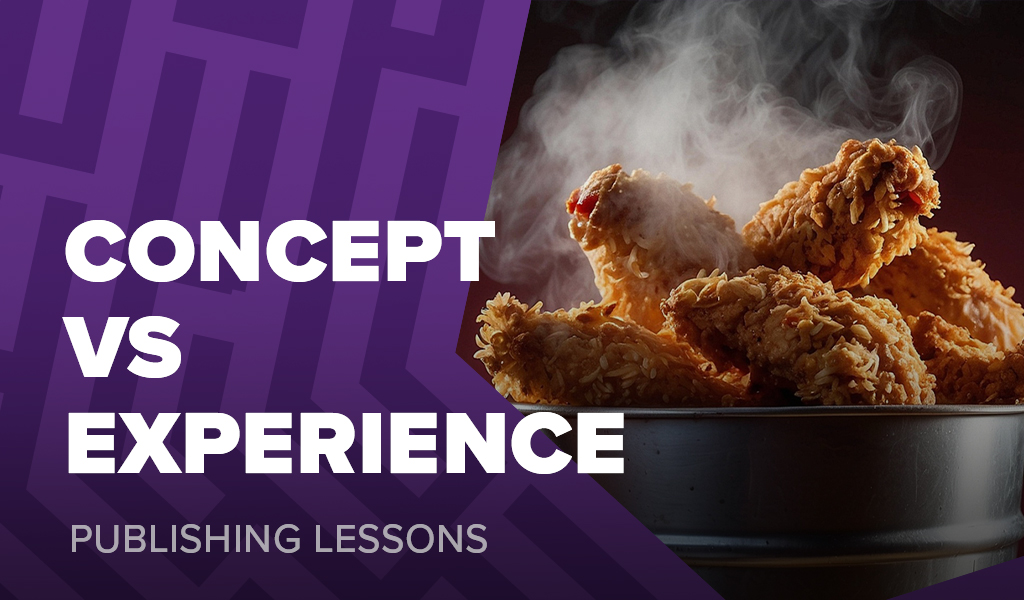Concept vs Experience

It was a sunny Friday afternoon, and Sara had just got home from work. I said, “Let’s get back in the car,” and we headed over to a nearby retail park.
A new Popeyes restaurant had opened — my favourite American fast food chain was finally in my home city — and I’d been looking forward to it for weeks. It might seem like a small thing, but sometimes small things are what turn a normal evening into something you’ll remember.
The place was packed. There was a queue outside and I knew it was going to be chaos, but I still chose to go. Not because I thought it’d be quick or smooth — but because I was sold on the concept. The idea of being part of the grand opening, the celebration, the energy of the first day — it sounded fun, something different.
Of course, it didn’t go how I’d hoped. The queue was poorly managed. The wait was long. And the experience, well… it didn’t deliver what the concept had promised.
But it got me thinking — because this kind of thing comes up a lot when designing and publishing games.
What grabs people, and what keeps them
When I’m working on a new game, I think a lot about the concept.
That’s the thing that makes someone stop and look. The theme. The elevator pitch. The cool mechanic. Whatever it is, it’s the bit that gets people to click on a thumbnail, pick up a box, or back a campaign.
But the experience — what happens when they actually play the game — is what decides whether they keep playing. Whether they tell a friend. Whether they look out for your next thing.
The concept is what sells the game once. The experience is what makes it stick.
When the balance shifts
I’ve been thinking about this every day for months now, while I’ve been working on a new campaign-style game, where that balance becomes even more important — as players discover new things over time.
Because now, it’s not just about one big concept and one overall experience. It’s a series of moments — reveals, surprises, boxes, envelopes — each one promising something new.
Let’s say a player opens a box after finishing the first scenario. Inside is a single card with one short line that changes a core rule of the game.
It’s clever. It shifts the game in an interesting way. But still, there’s that feeling of… “Oh. That’s it?”
Because the box promised more. The concept of the reveal created an expectation that wasn’t met.
Flip it around and you get the opposite problem: a box filled with shiny new components, loads of bits and bobs — but when you start playing, it feels the same. Now you’ve got more setup, more clutter, but not much payoff.
In both cases, the balance is off. The concept and the experience don’t line up.
Designing with emotion in mind
That doesn’t mean every box needs to be full of surprises, or that every reveal needs to reinvent the game. But it does mean we need to think about how these moments feel.
What is the promise we’re making — and how are we delivering on it?
And sometimes it’s not even about the specific outcome, but the memory it leaves behind. That opening day at Popeyes? In five years, I’ll probably remember the funny bits, the weird queue, the sense of “we were there when it opened.” Even if the experience didn’t live up to the concept, the story stuck, a memory was created.
That’s what games can do too. If we hit the right emotional beat — a moment of surprise, a laugh, a groan, a shared win — then that’s what people remember.
Final thoughts
Every game needs a strong concept — it’s what gets people to stop and take notice.
But the experience is what turns a curious player into a returning one.
And whether you’re designing a new game or a campaign reveal, ask yourself this:
- What is this moment promising?
- What will it actually feel like?
- And when the game’s been packed away, what will players remember?
Because when concept and experience work together — when the moment feels as good as it looked — that’s when something truly memorable happens.
And that’s when people come back for more.
Frank West
Frank West is a gamer and designer based in Bristol, UK. He published his first board game, The City of Kings, in 2018 and now works on other games and organising events in the local area. His goal? To design and publish games focusing on immersive themes, fun mechanics and beautiful components. If you have any questions or would just like a chat, feel free to get in touch at any time!

